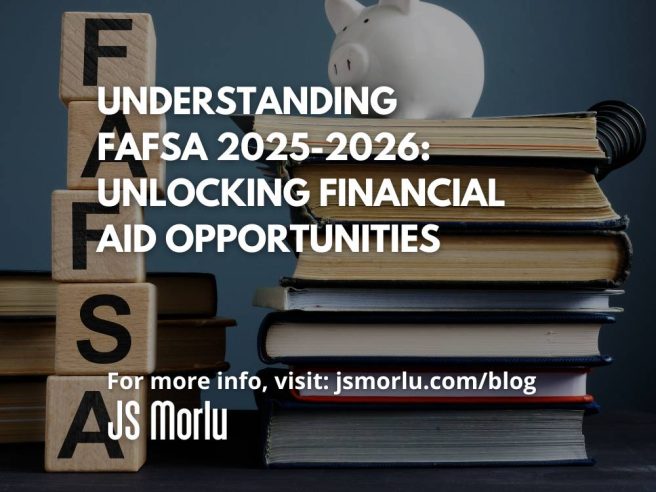As students and parents prepare for the upcoming academic year, one important date to remember is December 1, 2024—the opening day for the Free Application for Federal Student Aid (FAFSA) for the 2025-2026 school year. This marks the second consecutive year that the FAFSA has been delayed from its traditional October 1 opening date. Understanding the FAFSA process is crucial for students seeking financial assistance for their college education. In this blog post, we’ll explore everything you need to know about the FAFSA, its requirements, and how to maximize your financial aid opportunities.
What is FAFSA?
The FAFSA is a vital form that students must submit annually to determine their eligibility for federal financial aid, as well as some college-based aid. Filling out the FAFSA is not just a formality; it plays a significant role in accessing funds that can help cover tuition, fees, and other educational expenses.
Why File the FAFSA?
Filing the FAFSA is essential for a variety of reasons:
- Access to Federal Aid: All students who complete the FAFSA are eligible for an unsubsidized federal Direct Loan, which can help cover educational costs regardless of financial need.
- Subsidized Loans: For those who demonstrate financial need, the FAFSA opens the door to subsidized Direct Loans. These loans benefit students because the government pays the interest that accrues while they are in school or during deferment periods.
- Federal Pell Grants: Students with a significant level of financial need may qualify for a Pell Grant, a form of aid that does not require repayment.
- Institutional Aid: Many colleges and universities require the FAFSA for awarding their own financial aid, including merit scholarships and grants.
The FAFSA Filing Process
To ensure a smooth filing process, students and parents should follow these steps:
- Create an FSA ID: Each parent and student must create a Federal Student Aid ID (FSA ID), which acts as a legal signature for the FAFSA. This ID can be created online and is valid for all college years.
- Gather Necessary Information: The FAFSA requires specific information regarding income and assets. For the 2025-2026 school year, it will rely on income information from the 2023 federal income tax return, which can be imported directly from the IRS. This simplifies the process and reduces errors.
- Assess Asset Values: When filing the FAFSA, it is important to report the value of your assets as of the date you submit the form. This includes savings accounts, investments, and other financial resources.
- Submit the FAFSA: The best way to file is online through the official FAFSA website. This allows for quick processing and immediate feedback if there are any issues with your submission.
Understanding the Student Aid Index
Once the FAFSA is submitted, the information provided is used to calculate the Student Aid Index (SAI). This index is crucial because it serves as a benchmark for determining a student’s eligibility for various forms of aid. Colleges utilize the SAI to create financial aid packages tailored to meet a student’s financial needs, though it’s important to note that colleges are not required to meet 100% of a student’s demonstrated financial need.
What Happens After Filing?
After completing the FAFSA, students will receive a Student Aid Report (SAR) summarizing the information submitted. This report provides insights into the financial aid options available and should be reviewed carefully for any discrepancies or necessary corrections.
Common Misconceptions About FAFSA
Many students and parents harbor misconceptions about the FAFSA process. Here are some clarifications:
- Filing Doesn’t Mean You Have to Accept Loans: Just because you file the FAFSA and are offered loans, it doesn’t mean you must accept them. The FAFSA simply provides the opportunity for students to access loans and grants if needed.
- Filing is Beneficial Even Without Loans: Some colleges require the FAFSA for awarding specific types of aid, including merit-based scholarships. Even if you don’t intend to take out federal loans, completing the FAFSA can be advantageous.
Key Dates to Remember
- FAFSA Opens: December 1, 2024
- FAFSA Deadlines: Each state and college has specific deadlines for FAFSA submission, so it’s crucial to check those dates to ensure you don’t miss out on potential aid.
Conclusion
Filing the FAFSA is a vital step in securing financial aid for college. By understanding the requirements, gathering the necessary information, and submitting the form on time, students can maximize their financial aid opportunities. Remember, even if you’re unsure about taking out loans, completing the FAFSA can unlock various forms of aid that may significantly alleviate the financial burden of higher education.
For a visual guide through the FAFSA process, check out our informative video below.
By following these guidelines, you can navigate the FAFSA landscape with confidence and set yourself up for a successful academic journey. Don’t hesitate to reach out for assistance if you have any questions during the application process!
JS Morlu LLC is a top-tier accounting firm based in Woodbridge, Virginia, with a team of highly experienced and qualified CPAs and business advisors. We are dedicated to providing comprehensive accounting, tax, and business advisory services to clients throughout the Washington, D.C. Metro Area and the surrounding regions. With over a decade of experience, we have cultivated a deep understanding of our clients’ needs and aspirations. We recognize that our clients seek more than just value-added accounting services; they seek a trusted partner who can guide them towards achieving their business goals and personal financial well-being.
Talk to us || What our clients says about us


